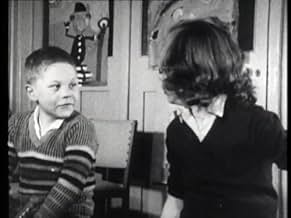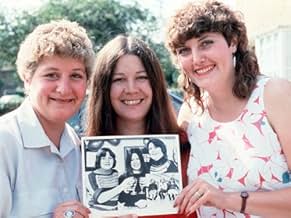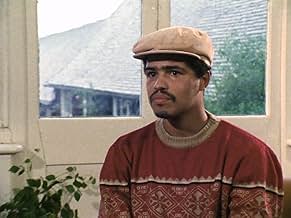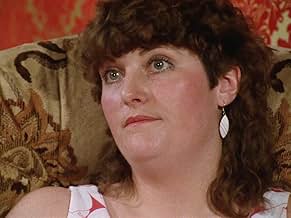28 Up
- Película de TV
- 1984
- 2h 16min
PUNTUACIÓN EN IMDb
8,1/10
3,2 mil
TU PUNTUACIÓN
Añade un argumento en tu idiomaThis eye-opening episode uncovers human nature and the desire to survive and succeed in all its heart-breaking glory.This eye-opening episode uncovers human nature and the desire to survive and succeed in all its heart-breaking glory.This eye-opening episode uncovers human nature and the desire to survive and succeed in all its heart-breaking glory.
- Ganó 1 premio BAFTA
- 3 premios y 3 nominaciones en total
Bruce Balden
- Self
- (as Bruce)
Jacqueline Bassett
- Self
- (as Jackie)
Symon Basterfield
- Self
- (as Simon)
Andrew Brackfield
- Self
- (as Andrew)
John Brisby
- Self
- (metraje de archivo)
- (as John)
Peter Davies
- Self
- (as Peter)
Suzanne Dewey
- Self
- (as Suzi)
Charles Furneaux
- Self
- (metraje de archivo)
- (as Charles)
Nicholas Hitchon
- Self
- (as Nick)
Neil Hughes
- Self
- (as Neil)
Lynn Johnson
- Self
- (as Lynn)
Paul Kligerman
- Self
- (as Paul)
Susan Sullivan
- Self
- (as Sue)
Tony Walker
- Self
- (as Tony)
Michael Apted
- Interviewer
- (voz)
- (sin acreditar)
Michelle Murphy
- Self (age 7, with Tony)
- (metraje de archivo)
- (sin acreditar)
Reseñas destacadas
In 28 Up, it seems like the 'the Man' part of the 'Give me a Child' bit that is quoted in every Up movie is starting to take shape, for the men and women. Or, at least, most of them. We see the gradual progression of life start to take shape: careers, over the course of the people's 20's, have been sought out, and they've gotten married and/or had children. Some, in fact, who weren't married before have been changed for the better it would seem by being married (i.e. Jackie), and some aren't living in Britain anymore (one is a physicist living in America with his wife, another has lived in Australia for quite a long time).
The series in this 'episode' film centers around the real progress into adulthood, and how the interviewees now feel about how their lives, loves, careers have progressed. A given topic that comes up is how they think they've changed since being in the first film at seven, and the consensus, a strong one presented, is that a person is at least, potentially, there at the age, but needs to grow (like a seed). It's fascinating too to see how the children in groups have progressed about as expected, or with some relativity. For example the three boys, now adults, sitting in the same line (albeit one of them declined to be interviewed, ironic since he works for the BBC in 1985), one of whom a prissy, upper class citizen, and another not so much, based on hair-length perhaps.
In general 28 Up seems to view the subjects as they would be naturally by this point as adults, and some, like the bricklayer, revealed how they might turn out when let loose in the 'playground' at age seven, some building a house and some, well, not (another fascinating subject like this is the former jockey turned cab driver). And yet a good deal of these subjects, at least for the moment of 28, look set for their life, either with a current wife or kids or a steady income at something they've worked for... which brings us to Neil. He's the one who, at 28, has no current prospects, who was happy as a child but now is disillusioned to the fact that he doesn't have a career or much of a life, but in a way is fine with that (he applied to Oxford, but didn't get in). He's the stark, fascinating contrast that gives 28 Up a great sense of depth. The class system in Britain, or just in how it sets up these kids, is revealed in the highs, mediums and lows of living, and Neil is certainly a low, but not feeling bad about it (at the least, he says, he can eat now, unlike some years before).
The series in this 'episode' film centers around the real progress into adulthood, and how the interviewees now feel about how their lives, loves, careers have progressed. A given topic that comes up is how they think they've changed since being in the first film at seven, and the consensus, a strong one presented, is that a person is at least, potentially, there at the age, but needs to grow (like a seed). It's fascinating too to see how the children in groups have progressed about as expected, or with some relativity. For example the three boys, now adults, sitting in the same line (albeit one of them declined to be interviewed, ironic since he works for the BBC in 1985), one of whom a prissy, upper class citizen, and another not so much, based on hair-length perhaps.
In general 28 Up seems to view the subjects as they would be naturally by this point as adults, and some, like the bricklayer, revealed how they might turn out when let loose in the 'playground' at age seven, some building a house and some, well, not (another fascinating subject like this is the former jockey turned cab driver). And yet a good deal of these subjects, at least for the moment of 28, look set for their life, either with a current wife or kids or a steady income at something they've worked for... which brings us to Neil. He's the one who, at 28, has no current prospects, who was happy as a child but now is disillusioned to the fact that he doesn't have a career or much of a life, but in a way is fine with that (he applied to Oxford, but didn't get in). He's the stark, fascinating contrast that gives 28 Up a great sense of depth. The class system in Britain, or just in how it sets up these kids, is revealed in the highs, mediums and lows of living, and Neil is certainly a low, but not feeling bad about it (at the least, he says, he can eat now, unlike some years before).
"Give me the child until he is seven, and I will give you the man." So goes the old proverb, and the proof is in this fascinating documentary, the fourth chapter in an ambitious, ongoing epic of non-fiction filmmaking already two decades in the making at the time.
The project began in the middle 1960s as a modest examination of English class divisions in a group of seven-year old children from different social backgrounds, and has been updated every seven years to show their progress through adolescence to young adulthood. Each individual biography resists the pre-determined notions of (specifically English) status and privilege around which the entire cycle of films is based, becoming instead a record of the same, sometimes rocky path to maturity followed by everyone, regardless of upbringing. At age seven every child is carefree and impressionable; at fourteen most are sullen and inhibited, uncomfortable in puberty; at twenty-one they are, by degrees, poised to reach their potential: eager and naive or cynical and confused.
And by age 28 their niche in society has been secured, for better or (sadly) for worse. The candid self-analysis, and the range of insight and opinion, makes the film (individually, and as a series) an invaluable document of human growth and development, as well as an irresistible reminder of our own personal destiny.
The project began in the middle 1960s as a modest examination of English class divisions in a group of seven-year old children from different social backgrounds, and has been updated every seven years to show their progress through adolescence to young adulthood. Each individual biography resists the pre-determined notions of (specifically English) status and privilege around which the entire cycle of films is based, becoming instead a record of the same, sometimes rocky path to maturity followed by everyone, regardless of upbringing. At age seven every child is carefree and impressionable; at fourteen most are sullen and inhibited, uncomfortable in puberty; at twenty-one they are, by degrees, poised to reach their potential: eager and naive or cynical and confused.
And by age 28 their niche in society has been secured, for better or (sadly) for worse. The candid self-analysis, and the range of insight and opinion, makes the film (individually, and as a series) an invaluable document of human growth and development, as well as an irresistible reminder of our own personal destiny.
The 'Up Series' represents one of the most fascinating and unusual uses of film in cinema history - a documentary life-long chronicle of the lives of 14 people starting at 7 years old, revisiting them every seven years through age 49 (so far).
While I could quibble, wishing for a bit more depth here and there (especially with the women, where there's a bit too much emphasis on love and marriage at the expense of all else), it's really an astounding, moving, frightening and uplifting document. There's no way to watch this remarkable series of films without reflecting deeply on one's own life, and how you have changed (and stayed the same) over your own lifetime.
While Michael Aped deserves every bit of credit he's received for this amazing piece of cultural anthropology, it's important to note this first film, 7 Up,was actually directed by Paul Almond, and Apted was a that point a researcher for the project.
While I could quibble, wishing for a bit more depth here and there (especially with the women, where there's a bit too much emphasis on love and marriage at the expense of all else), it's really an astounding, moving, frightening and uplifting document. There's no way to watch this remarkable series of films without reflecting deeply on one's own life, and how you have changed (and stayed the same) over your own lifetime.
While Michael Aped deserves every bit of credit he's received for this amazing piece of cultural anthropology, it's important to note this first film, 7 Up,was actually directed by Paul Almond, and Apted was a that point a researcher for the project.
The highlights here are Nicholas and his relocation to Wisconsin and Neil continuing down the spiral of depression. Other than that, most of the subjects have just settled into comfortable, and somewhat mundane, lives. I was disappointed not to get more of John's douchiness, but he declined to be interviewed, as did one of the other rich (but far less douchey) kids. It's amusing to see the way Apted keeps trying to badger his subjects into expressing some kind of rage against the upper class, yet they're having no part of his agenda. They all (with the exception of Neil) seem quite content with their standing. I've decided to soldier on with the series, mostly because I've already invested so much in it, but I also remain curious about a few of the subjects.
Filmmaker Michael Apted's pet project for British television (released theatrically in several countries) is an occasionally fascinating, sometimes boring documentary which spans many years as Apted interviews a handful of British schoolchildren in the 1950s, catching up with them seven years later and so on until the kids have reached the age of 25. For the sake of cinema, it is a shame that the subjects whom Apted initially chose for his portrait turned out to be such colorless personalities. There are a few tragedies which unfold with the heartrending beauty of fictional melodrama, yet this installment runs out of intriguing moments long before it is over. Apted is to be commended, nevertheless, for a brilliant cinematic idea. Followed in due time by "35 Up", "42 Up", "49 Up". **1/2 from ****
¿Sabías que...?
- CuriosidadesPeter Davies lost his job as a teacher because of the anti-Thatcher comments he made in this film.
- Citas
Neil Hughes: If the state didn't give us any money, it would probably just mean crime and I'm glad I don't have to steal to keep myself alive. If the money runs out then for a few days there's nowhere to go and that's all you can do, I simply have to find the warmest shed I can find.
- ConexionesFeatured in 35 Up (1991)
Selecciones populares
Inicia sesión para calificar y añadir a tu lista para recibir recomendaciones personalizadas
Detalles
- Duración2 horas 16 minutos
- Color
- Mezcla de sonido
- Relación de aspecto
- 1.33 : 1
Contribuir a esta página
Sugerir un cambio o añadir el contenido que falta























